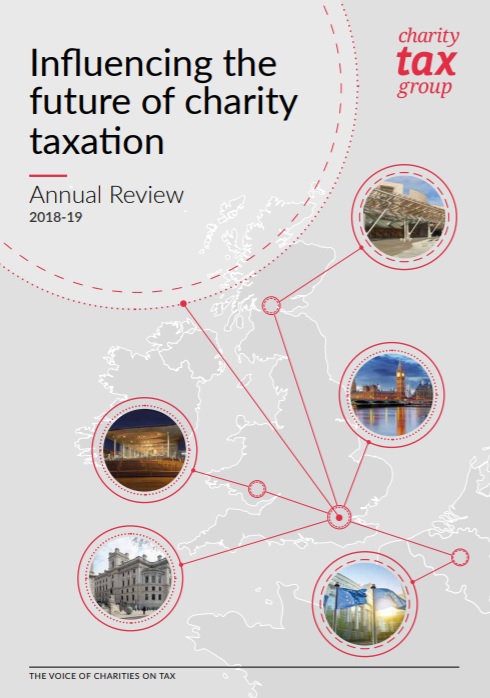Charity Tax Group Annual Review 2018-19
The Charity Tax Group has published its Annual Review 2018-19, which highlights the organisation’s work “Influencing the future of charity taxation”.
Charity Tax Group Annual Review 2018-19
The Annual Review includes a summary of the work undertaken by the Gift Aid practical issues working group as well as a summary of CTG’s important VAT research project.

Influencing the future of charity taxation
As I reflect on another busy year, I am amazed at the breadth of issues on which the Charity Tax Group (CTG) has been working.
While a lot of this work goes on in the background, CTG can be proud of the way it continues to deliver results for charities that help to improve their financial position and simplify the tax system.
This is only possible because of the strong working relationships we have established with key decision-makers at HM Treasury and HMRC, who clearly regard our representations as credible, informed and worthy of serious consideration.
Last year’s Budget is an important case in point: the changes announced to the Gift Aid Small Donations Scheme, Retail Gift Aid Scheme and small trading exemption threshold were three of the key issues that members discussed directly with the Minister at last year’s Conference and were then formally proposed by CTG. The Minister has shown that he is willing to introduced targeted administrative changes that will simplify the tax system for charities and donors and reduce costs. We are delighted that he is returning to address this year’s Conference which, once again, will give members the opportunity to get their views across.
This is likely to be the most critical year in decades for shaping charity tax policy. Irrespective of how Brexit is settled, VAT reliefs and rates will come under scrutiny because in Europe the Commission is looking to overhaul the VAT system. Even if the UK is no longer tied to the EU’s VAT regime, the UK Government will certainly take stock of how it can best use the UK VAT system to achieve its policy goals. Initially, policymakers will be looking at the bigger picture but, in preparation for the more detailed scrutiny of the VAT system that will be undertaken over the next couple of years, we need to ensure that we secure the best outcome for charities. As outlined later in this Review, CTG is investing time and money into a detailed research project to quantify the value of existing charity VAT reliefs and the added value that they bring to society. Feedback and financial support from charities is essential to enable us to progress this important research which will inform our representations to the Treasury.
Also, later this year, the Charity Tax Commission will be publishing its findings and recommendations on the future of the tax system as a whole. CTG is a member of the Commission’s Advisory group and, on behalf of our members, submitted a detailed response to the consultation based on member feedback. Our fundamental calls were for the tax system to be future-proofed and for long-term distortions (most notably irrecoverable VAT) to be addressed. We emphasised the importance that any proposals reinforce the core principles underpinning charity tax, particularly that the
tax system should not discriminate between organisations that are recognised as charities in the various UK jurisdictions and also that donors should not be taxed on money they have given to support charities rather than use for personal benefit.
Other priorities in the coming year include the introduction of Making Tax Digital for VAT reporting requirements, and preparation for the extension of off-payroll working rules for medium and large charities from April 2020. We continue our negotiations with HMRC on the VAT treatment of online charity advertising and we hope that this time next year we will be able to report positive developments in respect of a VAT reduction for e-publications, which would be very valuable to many charities. The Gift Aid working group continues to grow in size and stature and is now undoubtedly a very influential sounding board for HMRC on both practical and strategic reforms of the relief.
My thanks go once again to Graham Elliott, CTG’s technical adviser, and to our volunteer Management Committee – together they provide extensive support and expertise to the organisation. Special thanks are due to Karen Atkinson, who is stepping down at CTG’s Treasurer, leaving the books in very good order (although as ever, we continue to need your financial support!), and also to Darren Spivey and Polly Dickinson, who have provided wise counsel and support to CTG during their times as directors. I should also like to thank you, our charity and Observer members, for your input and support – CTG could not make the same impact without it.
I look forward to working with all of you over the coming year
John Hemming, Chairman